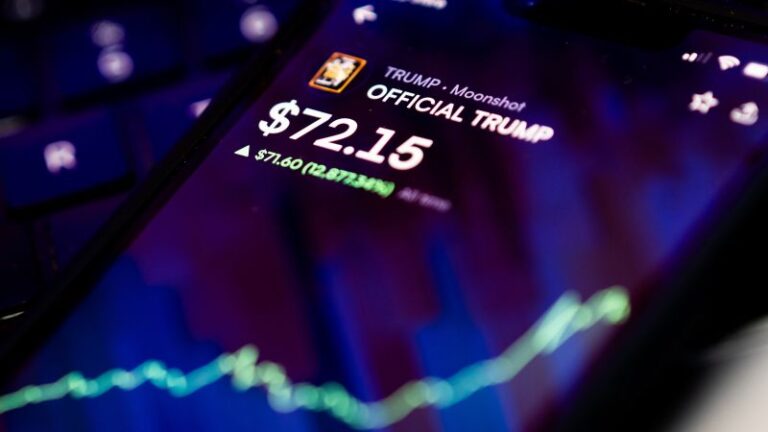new York
CNN
—
President Donald Trump promised crypto investors that he would usher in a era of legitimacy for an industry that has long been relegated to the financial wilderness – dismissed by some mainstream investors as a highly speculative bet at best or an elaborate Ponzi scheme at worst.
But days before his inauguration, Trump shocked many of his crypto supporters by peddle a digital token known as a meme coin, a functionally worthless asset that trades on hype and is a favored vehicle for scams known as carpet pulls.
To be clear, not all meme coins are scams, and $TRUMP and $MELANIA coins appear to have built-in safeguards to prevent a rug pull. Specifically, the Trump coin website states that its majority holders are subject to a three-year unlock schedule, so they cannot sell everything at once. But even without selling a single token, the Trump Org. had garnered approximately $58 million in a single day, in trading fees alone, according to Conor Grogan, a crypto researcher and former Coinbase executive.
Yet meme coins have become known for rug draws, in which developers flip a coin, raise its price, and quickly cash out. If this sounds familiar, “Hawk Tuah” influencer Haliey Welch was recently sued compared to its own coin, which briefly reached a market cap of $500 million before falling 90%. Welch said in a statement published on last month, that it is taking the situation seriously and is working to help affected investors.
Meme coins represent the absurd, sometimes fraudulent, side of crypto that increasingly wealthy supporters of widely traded bitcoin and ether would like to move beyond. The fact that the first “pro-crypto” US president is selling a token with no tangible utility has some in the industry judging Trump and his advisers as they prepare to overhaul the US regulatory regime with new zeal for the assets digital.
“Trump must fire his crypto advisors, top to bottom” tweeted Gabor Gurbacs, founder of digital asset company Pointsville.
A giant ethical concern centers around Trump’s majority ownership of the tokens: 80% of the coin supply is held by Trump Organization subsidiaries CIC Digital and Fight Fight Fight LLC – a concentration that appears designed to personally enrich the president. Trump Org did not respond to a request for comment, but Eric Trump, the company’s executive vice president, said in a post on Saturday: “I am extremely proud of what we continue to accomplish in crypto . $Trump is currently the hottest digital meme in the world.
“Even meme coin enthusiasts are skeptical of projects in which the majority of tokens are not owned by a broader community and appear to be designed in a way that disproportionately benefits insiders,” Gareth Rhodes told me , managing director of the consulting firm Pacific Street. “But it’s early and the launch team can still take steps to make this a more community-focused project.”
Ethics experts quickly denounced the apparent conflict of interest.
Walter Shaub, the ethics watchdog who confronted Trump during his first mandate before retiring, said to my colleague Matt Egan the coin flip suggests that “the very idea of governmental ethics is now a smoking crater.”
The Trump administration, which officially entered the White House Monday, did not respond to CNN’s request for comment.
The estimated $3.5 trillion global crypto market is a big tent, and although tokens like Bitcoin dominate the industry, the open source and decentralized nature of blockchain, the infrastructure of crypto, allows any developer can easily launch a token, increase its price and leave with complete impunity. According to ForbesBetween 40,000 and 50,000 new meme coins are created every day, with a combined market value of $100 billion.
Last week, just days before Trump launched his token, the New York State Department of Financial Services issued a consumer alert on even “rapidly proliferating” coins, which present “an exceptional risk of fraud and loss of funds.”
Matthew Homer, a former financial regulator and now general partner at crypto firm Department of XYZ, echoed a common industry refrain that the lack of regulatory clarity around crypto has contributed to these fraud risks.
The Securities and Exchange Commission’s approach, he said, “has created a situation in which projects with genuine utility face significant regulatory hurdles, while purely speculative assets do not.” .
While bitcoin, the original cryptocurrency, presents itself as a sophisticated innovation with the power to revolutionize the financial system, meme coins have little function outside of gaming. They are also extremely volatile, in part because they are typically owned by a small group of investors rallying around a niche, fleeting moment in internet culture.
In other words, they’re not serious, and crypto bulls fear that the president’s intrusions will delay progress on serious issues he’s promised to solve, like giving investors more clarity and openness in regulatory matters. Plus, it doesn’t help crypto in its years-long quest to shake its sometimes sketchy nature. reputation if the president who regulates American industry could at the same time profit from it.
“In general, the introduction of any coin ruffles the feathers of those who are serious about the use, legitimacy and security of crypto,” said Kyla Curley, a crypto expert and partner at global consultancy StoneTurn. But, she said, Trump’s meme pieces “should not lead us to assume that the Trump administration will not seek to strengthen the regulatory environment for crypto.”
Across the industry, there seemed to be a feeling that crypto adults would just need to hold their noses during the coin drama. It may be embarrassing, but it’s better than suffering under the reign of outspoken crypto-skeptic Gary Gensler, who oversaw the Securities and Exchange Commission and became an industry bogeyman.
“The industry, whether a fan of meme coins or not, is excited about a new era for the regulatory approach to crypto,” Rhodes said.

